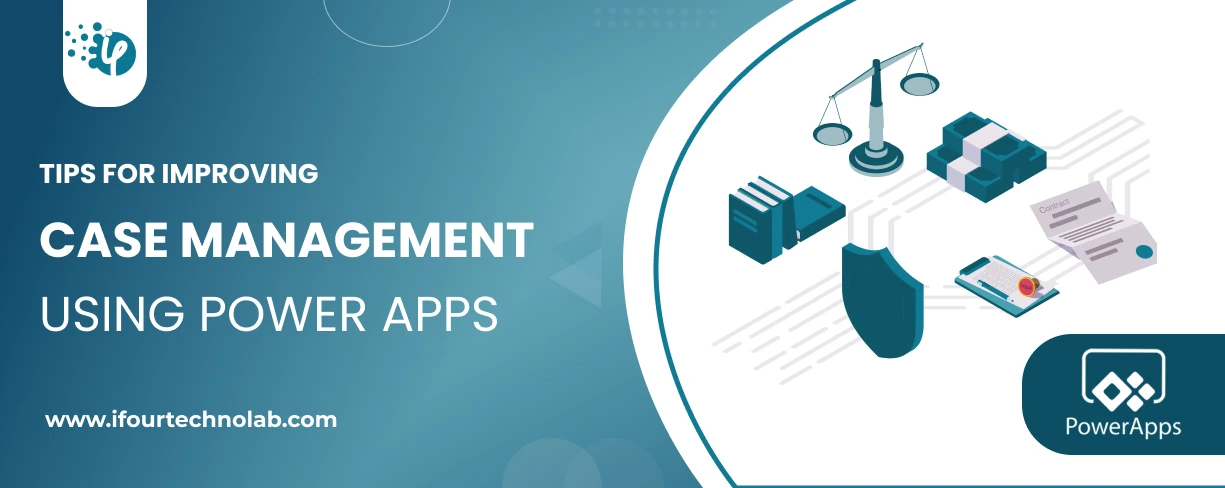How to Do Forecasting in Power BI (Steps & Accuracy Metrics)
Remember our last guide - Power BI forecasting? It revealed things that truly blocks accuracy, both structural and situational. Now it's time to take the next step. Knowing Power...
Listening is fun too.
Straighten your back and cherish with coffee - PLAY !

How to improve case management? - This question is common for attorneys and legal consultants looking to enhance their operations. And why is it so? Because efficient case management is crucial for law firms to deliver better client service, optimize workflows, and stay compliant with legal standards.
While various methods are available which require keen efforts, one simple solution which makes case management effortless is leveraging Microsoft Power Apps.
Now the next question is how to improve case management using Power Apps. Is it really effective?
To address your concerns, we’ve put together this blog featuring 13 essential tips to improve case management using Power Apps.
Power Apps is a magnificent tool that helps you:
Explore these use cases of Power Apps to learn more.
Power Apps help you manage custom workflows through which you can ensure that deadlines are met, legal tasks are prioritized, and updates are accessible to all team members. Check out the following tips to use Power Apps to improve case management.
Customizable case templates in Power Apps can significantly enhance case management for law firms. By using predefined templates, legal teams can streamline processes, ensure consistency, and save time across cases.
Here are some tips on how to utilize customizable case templates effectively:
Did you know that you can actually combine Power Apps and Power Automate to automate some legal tasks? However, you might require a Power Automate consulting services provider to help you out.
Meanwhile, check out the differences between Power Apps and Power Automate.
Centralized Client and Case Data Management provides law firms with a unified platform to handle all client and case-related information, offering several key benefits.
Power Apps for case management in a unified platform stores everything in one place client details, case files, documents, and communication records. This means team members can quickly find and share the information they need, reducing time wasted searching through different systems or documents.
Therefore, managing cases using Power Apps ensures:
A unified platform helps protect client data from unauthorized access and ensures the firm meets legal requirements.
Drive your legal decisions effortlessly with our Power BI Consulting Services
Task Automation is a major benefit of using a unified platform for case management in law firms. It helps automate routine tasks by making the process faster and more efficient.
For example, updating cases manually can be time-consuming. With automation, case updates happen automatically when new information is added. This keeps the team informed without needing to manually check or update records.
Read More: Top 10 Technology Trends in Legal Industry
Reminders are another area where automation helps. Instead of relying on someone to remember important dates or deadlines, the system can automatically send reminders to the right people. This ensures that important tasks like filing documents or meeting with clients are never missed.
Similarly, notifications can be automated to keep clients and team members informed about case progress. If there’s a court date change or a new document is added to the case, the system can send automatic notifications. This reduces the need for constant communication and keeps everyone updated in real-time.
Real-time document sharing with Power Apps allows team members to access, edit, and comment on documents simultaneously. This means everyone stays updated with the latest information and multiple people can work on a document without version conflicts.
Task assignment and tracking are other important features. Legal teams can assign tasks to specific members, set deadlines and monitor progress within the platform. This keeps everyone aware of their responsibilities and ensures that tasks are completed on time.
Get your workflows secured with Kotlin App development company
Integrated communication tools such as chat and video conferencing are also beneficial. These tools allow team members to discuss case details, share updates, and resolve issues quickly without leaving the platform.
Integrating Calendars and Deadlines is a powerful feature for managing case deadlines efficiently. When a unified platform integrates seamlessly with calendars, it helps legal teams stay organized.
Read More: Web App vs Desktop App: Essentials Explained
This system manages who can view or edit specific data based on their role within the organization.
Here’s how it works:
#1 Access Control
Power Apps secure legal workflows in various ways and among those ways is Role-based access control. It assigns permissions to a user's role in your legal company. While Managing Partners might have broader access, including financial records and sensitive legal strategies, others have limited access. This ensures that individuals only see the information necessary for their job.
#2 Data Security
By restricting access to sensitive information, role-based access minimizes the risk of unauthorized data exposure. Only those with the proper permissions can access or modify certain data which helps protect confidential client and case information from unauthorized viewing.
#3 Audit Trails
Role-based access often includes tracking and logging features. This means that any access to sensitive information can be monitored and reviewed providing a record of who accessed what and when, which is valuable for security audits and compliance.
Partner with iFour for Legal software development services
Advanced Reporting Capabilities are essential for monitoring case progress and performance effectively. Custom reporting allows law firms to track reports to their specific needs by providing valuable insights into various aspects of case management.
Custom reports can be designed to track specific metrics and performance indicators that are relevant to the firm’s needs.
For example, reports can showcase timelines, client interactions, or billable hours. This helps in focusing on the areas that matter most for evaluating case progress and overall performance.
Attorneys are getting significant results by improving case efficiency with Power Apps. Here is how this integration benefits legal practices:
Benefit 1 - Smooth Data Flow
Integration allows for the automatic transfer of data between different systems, such as case management software, billing systems, and document management tools. This ensures that information is consistent across platforms, reducing the need for manual data entry and minimizing errors.
Benefit 2 - Enhanced Efficiency
By connecting with existing tools like email, calendars, and legal research databases, case management platforms streamline workflows. Improving case efficiency with Power Apps
Read More: 15 Benefits of Power Apps for CTOs
Benefit 3 - Centralized Access
Integration brings all relevant tools into a single, unified interface. Lawyers and staff can access various functionalities from one place, whether they need to pull up case files, check schedules, or review documents, making their work more efficient and consistent.
Benefit 4 - Customizable Integration
Many platforms offer customizable integration options to fit specific needs and workflows. This flexibility allows law firms to tailor the system to their unique requirements, ensuring a more personalized and effective setup.
Mobile Accessibility in case management boosts productivity by allowing legal professionals to work from anywhere. With mobile access, lawyers and staff can check case updates, review documents, and manage tasks on the go. This means they can respond to urgent matters quickly, even outside the office, and stay productive while travelling or working remotely.
Get flawless mobile apps built by .NET MAUI App development company
This integration feature allows automatic storage, retrieval, and organization of documents related to cases. Lawyers and staff can access case files, legal briefs, and evidence directly from the case management system, ensuring that all documents are updated and easily accessible. This integration reduces duplication of effort, improves document accuracy and streamlines workflows, making it simpler to manage large volumes of paperwork and maintain efficient case handling.
Custom notifications and alerts are essential for keeping teams informed about various events, such as upcoming deadlines, new case updates, or significant changes in case status.
For example:
A lawyer might get an alert about an upcoming court date or a new document added to a case, while a paralegal might be notified about a client's request or a pending task.
- These alerts help staff focus on what’s important and take quick action, making case management run smoother.
Read More: Security Best Practices for Power Apps
In addition, custom alerts support proactive management.
- This way team members can tackle problems instantly or seize opportunities right away, which helps them avoid delays.
Overall, having these notifications makes it easier for everyone to stay on top of their responsibilities and improve the workflow.
Data analytics provide a clear picture of case metrics, such as case duration, success rates, and resource allocation. By analyzing this data, legal professionals can make more informed decisions about case strategies, potential outcomes, and resource management.
Advanced analytics can predict future case outcomes based on historical data. For example, analyzing past case results can help identify factors that contributed to success or failure, allowing lawyers to adjust their strategies accordingly.
Handle your client’s data effortlessly with Azure SQL database services
One needs to collect input from clients, team members, and stakeholders, and firms gain insights into areas needing improvement regularly. This feedback is then analyzed to identify common issues or inefficiencies which will lead to changes.
For example, if feedback reveals slow document retrieval, adjustments can be made to streamline the process. Monitoring the impact of these changes ensures they are effective and ongoing feedback helps refine processes further. This iterative approach allows law firms to continuously adapt, improve efficiency and better meet client needs over time.
One of the interesting aspects of Microsoft Power Apps is the integration support with other Microsoft tools like SharePoint and Outlook which allows law firms to centralize data storage and communication.
So, all these are Power Apps tips to improve legal cases. In case you are looking to enhance or secure your legal processes using Power Apps, connect iFour and get your work done.
Power Apps for law firms offer a streamlined, efficient legal practice by automating tasks, enhancing collaboration, and integrating with existing tools. This leads to better organization, quicker responses, and more effective case handling.
This blog went through the top tips for using Power Apps for case management. Attorneys could see substantial results by using Power Apps to improve case management.
Power Apps, being a low-code development platform helps legal consultants with quick applications. In fact, it is also known for strong security, which is quite vital for legal practice documents.
So, future-proof your legal business today with our Power Apps consulting services. Let’s connect and discuss your needs.
At iFour Technolab, we specialize in Power Apps to optimize your legal operations, ensuring a more productive and efficient practice. Let us help you transform your case management today.
To increase case management efficiency, automate routine tasks and set up alerts for key events. Integrate with existing tools for easy access to information and use data to make better decisions and allocate resources effectively.
You’ve probably dealt with clunky workflows before—Power Apps can change that. It automates repetitive tasks, so you’re less likely to make manual errors. Collaboration gets easier too, with real-time communication and shared documents. And no more hunting for data—it’s all centralized, with custom dashboards to keep things neat. Plus, it’s cost-effective, cutting down on paperwork and operational expenses.
Ever wish you had more time? Power Apps automates routine work, freeing you up for strategic tasks. It streamlines everything, so errors are fewer, and collaboration is smoother. With all your case data in one place, you can quickly get insights. And on top of all that, you’ll save on costs by cutting down on manual processes.
You know how clients always want updates? Power Apps lets you create custom portals so they can check case info themselves. You can also automate communication—no more forgetting to send reminders or updates. Plus, you can gather client feedback easily to fine-tune your services and meet their needs better.
Change is tough, right? Some team members may resist new tech. Then there’s the tricky part—making sure all your data moves over smoothly from the old system. Customizing the app to fit your firm’s needs and integrating it with other software can also be a challenge.
Start with a solid plan—know what you’re trying to achieve. Make sure everyone’s comfortable with the new system by offering proper training and support. It helps to start small, with easy use cases, and grow from there. And if things get tricky, don’t hesitate to bring in a Power Apps expert for guidance.

Remember our last guide - Power BI forecasting? It revealed things that truly blocks accuracy, both structural and situational. Now it's time to take the next step. Knowing Power...

Security has always been a major concern. Your company spends millions on cybersecurity tools, and guess what? You’re still vulnerable. When you're working in the cloud, especially...

Automation isn’t just a trend anymore. It’s a must-have for any business relying on the Cloud. As the firm grows, cloud infrastructure gets more complex. So, choosing the right Infrastructure...